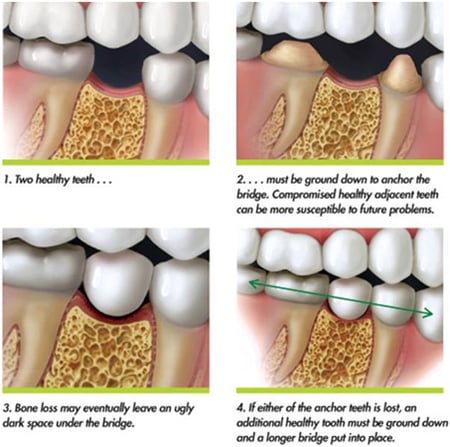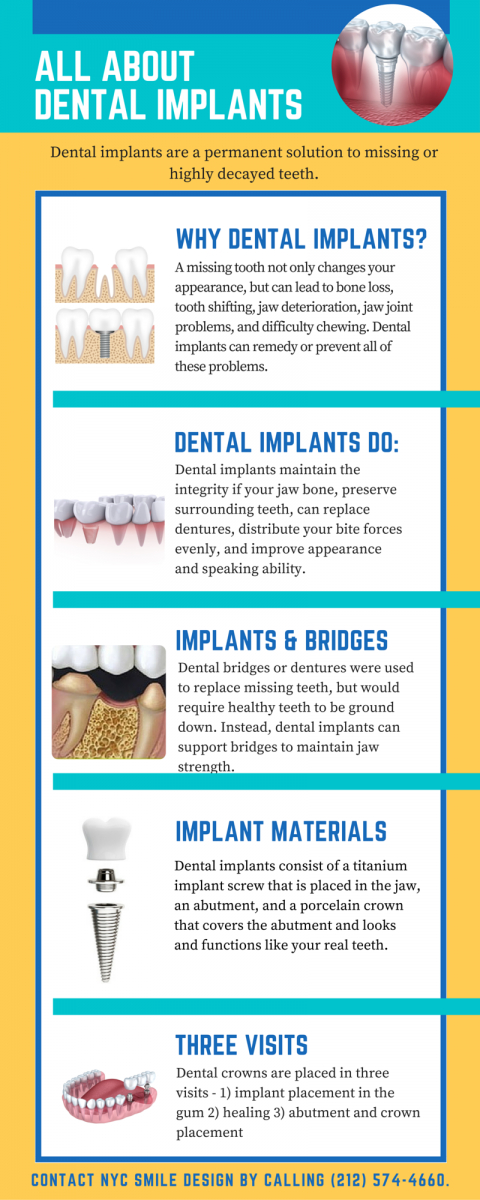Dental Implants: An Overview | NYC Dentist
December 20th, 2017
3 min read

Dental implants are small titanium screws that are inserted directly into jawbone to replace the roots of missing teeth. Replacing the roots of missing teeth is important for the preservation of both bite strength and facial structure. Dental implants are the only tooth replacement option that work to address both of these problems.
When a tooth is lost through trauma, infection, or decay, its root is lost as well. Tooth roots secure teeth into the jaw, but also serve to signal the body to continue fortifying bone around the teeth. When a root is gone, those signals cease, resulting in the shrinkage of bone and the eventual collapse of the jaw. Dental bridges and dentures, when not secured by dental implants, do not address missing roots and cannot prevent the jaw from shrinking and collapsing over time.

When bridges or dentures are secured to adjacent teeth or with adhesives, they may offer a reliable restoration of bite tension, but denture slippage and bridge collapse are possible as these restorations age. By contrast, bite tension can be completely restored with dental implants and no amount of usage will result in their coming loose, falling out, or failing to perform their function – and their function is simple: to provide the strongest, most reliable replacement for missing teeth.
If you live in Manhattan or surrounding areas of NYC and would like more information about dental implants, please call 212-452-3344 to schedule a consultation with Dr. Elisa Mello or Dr. Ramin Tabib and learn how we can restore strength and beauty to your smile.
Placing Dental Implants
Following your initial consultation, you will return to our office to begin planning dental implant placement. This first visit will include digital imaging of your jaw. This allows one of our New York City implant dentists to properly plan ideal placement. Once this has been determined, your surgical date can be scheduled.
Your next visit to our office will be for the placement of your dental implant. During this visit, the implant will be carefully inserted into your jaw. If your dental implant is in an area that is highly visible, we will fit you with a temporary restoration during this visit as well. That restoration will serve as a placeholder while the implant itself is secured into the jaw.
Following implant placement, osseointegration will occur. This is the process during which osteoblasts and connective tissue attach to tiny holes on the surface of the implant, making it immovable within the jaw. It is important to note that this process can take up to six months with traditional dental implants. We use Straumann implants, allowing us to reduce this waiting period to just a few weeks, and enabling us to save you precious time without compromising quality or aesthetics.
After your implant has integrated into your jaw, you will return to our office one last time for the placement of your porcelain crown, dental bridge, or implant-supported dentures. After your tooth-colored crown has been placed, full strength and function will be restored. With proper care, this same restoration will continue to produce a strong and attractive smile for years to come. We will provide you with detailed information about crown care to help ease this process and ensure your absolute satisfaction.

Dental Implant Longevity
Dental implants are designed to last for a lifetime. Once placed, your implant should not come loose or fall out as long as you take proper care of your teeth. Gum disease can weaken the bone supporting dental implants and, in severe cases of periodontitis, bone necrosis may allow an implant to fall out. To help prevent these issues, proper daily care and biannual visits to our office are strongly encouraged.
Properly daily care of your dental implant and porcelain restoration should include:
-
Using a soft-bristled toothbrush and nonabrasive toothpaste to brush after every meal. Twice a day may be sufficient, but we recommend brushing morning and night and after eating for optimal oral health
-
Flossing in between each tooth at least once a day. Twice daily flossing is ideal, though once daily may be sufficient at preventing tooth decay, gum disease, and other issues that can impact dental implant health
Under most circumstances, no significant changes will need to be made to your daily routine. During the healing phase of your dental implant procedure, some additional care may be needed to help prevent infection. This will be discussed in greater detail during your time in our care.
Dental Implant Candidates
 Nearly anyone who is over the age of 18 and missing one or more teeth is a good candidate for dental implants. If you lack proper jaw density to support an implant, bone grafting may be necessary. In these cases, an additional step will be added to the dental implant process, which will extend the amount of time required to complete your restoration by a few weeks.
Nearly anyone who is over the age of 18 and missing one or more teeth is a good candidate for dental implants. If you lack proper jaw density to support an implant, bone grafting may be necessary. In these cases, an additional step will be added to the dental implant process, which will extend the amount of time required to complete your restoration by a few weeks.
If you are not a good candidate for bone grafting and you lack the jawbone width or depth required to support an implant, our NYC implant dentists can discuss alternate methods of securing a dental bridge or adhering dentures. Modern methods of securing replacement teeth allow these traditional methods of tooth replacement to provide restoration of both strength and beauty. They cannot, however, provide all of the benefits offered by dental implants. Whenever possible, implants are the first recommendation from Dr. Mello and Dr. Tabib.
The best way to learn if you are a good candidate for dental implants is through a one-on-one consultation at the Manhattan office of NYC Smile Design. During this visit we can assess your jaw, discuss all of your tooth replacement options, and help you choose which one will produce the results you deserve. Please call us at 212-452-3344 to schedule a consultation today.
Dr. Elisa Mello and Dr. Ramin Tabib welcome patients living in and around New York City at our comfortable and convenient Manhattan office.
Topics:

